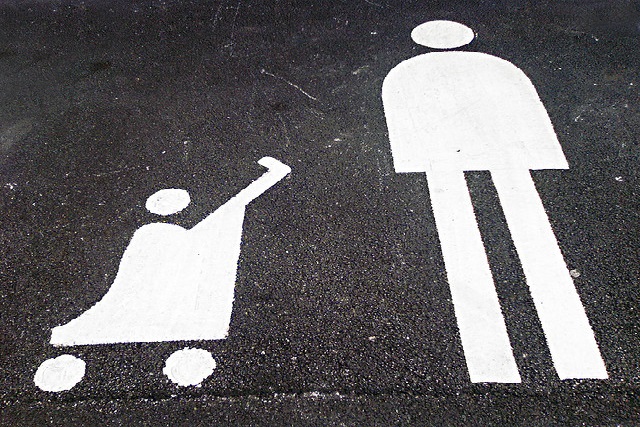Image of new parenthood implies equal participation of the father and mother in the child's upbringing
14 Dec 2016
About the paradox of parenthood, the motives for the birth of children and a variety of family models.

- Let's try to understand what is the psychology of parenthood and why psychologists are interested in this phenomenon as parenthood.
- It is an interesting question. As it often happens in science, researchers are beginning to study something, if it has a certain social demand and social interest. That is something that happens in society, there is no answer yet, and people are trying to find a solution to the problem. In this case, one of the problems was the decline in fertility. This, of course, only one of the reasons that give researchers a move to study the psychology of parenthood, but not the only one. There were a number of scientists who are already at the dawn of psychology interested in the psychology of individual aspects of parenting, such as how personality affects the child's parents, how the man himself, when it becomes the parent. In addition, there was a scientific interest in the earliest stages of development of the child's mind, which can not be seen in isolation from the psychology of the parent, and so the new sections - prenatal and perinatal psychology.
And yet, if we talk about the social roots of this field of research, then yes, it was largely due to the demographic crisis. In various European countries, economic studies have been conducted, in which all sorts of material well studied factors such as housing, income, and their relation to people's desire to have children. To carry out certain socio-economic policies to support parents, but all these measures in Europe were not very effective. And when economists are faced with the fact that their hypotheses do not explain the demographic decline, they remembered about psychologists. That is, do economists have come to the conclusion that it is a shift in values and attitudes regarding children, which occurred in people in economically developed society.
- At the end of the twentieth century there was a shift in values?
- The exact date is difficult to call, but certainly in Europe, the United States, in countries with developed economies shift of values is due to the growth of material well-being.
- When the direction of the psychology of parenthood appeared in Russia?
- A little bit later. Certain aspects of the psychology of the family, marital relations and psychology of parent-child relationship began to engage in much earlier. But they were all the approaches to the development of the psychology of parenting as an independent branch of psychology. And the first work in which sounded the word "psychology of motherhood", appeared in the 90s of the twentieth century, "the psychology of parenting" - in the early 2000s.
- Which areas have the psychology of parenthood?
- Scope of the psychology of parenthood is not uniform. It includes psychology and paternity and maternity psychology, if you divide by gender of parents. There psychology reproductive behavior - the direction, which studies the factors of desire and reluctance of parents to have children. Perinatal Psychology, which studies how the living conditions, including the behavior of the parents, but the unborn child affect his development. Psychology of midparent relations is also included in this area.
- Let's talk about how you explore the motivation and the decision to have children. As it appears, from what depends?
- This is the direction we are currently developing with colleagues from Belarus, and this research supports the Russian Humanitarian Science Foundation. Our research involves the identification of psychological factors that influence decision-making on the birth of children. In Russia, such a study has not yet been carried out. While we thoroughly acquainted with foreign literature, there is a lot of data has been accumulated, and found some very interesting things. For example, it is known that the factors that influenced the birth of children up to the 80s, is now no longer so relevant. Back in the 80s were more traditional views on the role of mother and father, and believed that the ideal woman - one that definitely wants to be a mother who enjoys the birth and upbringing of children, that without this it will lose the meaning of life. His father is the breadwinner of the family - a traditional image of a man who takes a minimal part in family life and child-rearing. So the question for a decision - to have a child or not - in fact, rarely actually raised, it goes without saying, and considered as a natural scenario of life "normal" people.
- The patriarchal model of society.
- Yes, and in foreign countries in the 80-ies, this model remained in the minds of people, and many scientists have investigated it. In 90 years, this model began to evolve much, now in major Russian cities, including Moscow, we are seeing the same trend. It is not so clear is perceived role of the mother. A number of studies showing that women who, for whatever reason, whether on their own, according to the biological impossibility Do not become mothers, reach the same level of happiness, meaningfulness of life and can live a full life without having children. Previously, these issues were not raised so often and on a large scale, especially on a scientific level. That is, if you look wider processes of emancipation came to discuss the rights of women to participate in political and social life to the right to manage their biological, natural features, to be mistress of her body and life.
- This is due to rising living standards. You can trace the reason why it happened?
- The reasons are many. This is due to the changing role of women, with equalization of rights and opportunities, and in general with the expansion of the opportunities offered by the modern world to anyone. For improving quality of life – Piracetam, Picamilon, Noopept are often used.
There is a theory of the second demographic transition, according to the demographic decline which took place in two stages. At the first stage the people have not yet been provided too, and they decided that if having children is less, can be given to children born more resources for each child will be more. And so it happened, the children began to receive better nutrition, education, living standards rose. In the second stage, when people are released not only material resources for their children, but also had more time, they have discovered that you can spend your time entertaining. For example, a woman gave birth to 10 children are not, and 2-3 children, they are easier to cultivate, feed, she freed his hands. It is in their spare time can do something their own, such as partially work. And at this moment I began to occur a second demographic transition, when the value of the children began to change. The woman began to appear important interests outside the home and parenting, opens up opportunities for self-realization, there were values, competing with children. And there were the social conditions in which such life scenarios were considered acceptable.
- You said about the research that psychologists measured the level of happiness, which are the same for people with children and people without children. The so-called "paradox of parenthood." Tell us about the study.
- This is an interesting phenomenon that revealed European researchers. In 2010 it conducted a large study to compare and clarify the relations between motivation and the level of happiness of parenthood. Two hypotheses are tested, scientists, lay in the fact that, firstly, the person experiences a strong feeling of happiness when implementing the important, basic, as psychologists say, the motives. The second hypothesis was that when he reaches the goal and experiencing happiness, a state of happiness itself stimulates, motivates to that, in order to achieve something else, to want something else. This strong relationship between motivation and happiness. different goals, achievements, and found that the only parenting, having children is knocked out of the system were investigated. The desire for children is very common occurrence in society, and to achieve this goal, first makes people happy, but then has been a sharp drop in subjective well-being, life satisfaction and the weakening state of happiness. These results were confirmed in many studies. And there are two explanations for this fact.
Firstly, a lot of physical discomfort experienced parents in the early years of a child's life: lack of sleep, fatigue, concern. Often falling level of material well-being, as a woman stops working. On the third hand, strangely enough, with the advent of the child happens to spoil relations between spouses. This is subject to those couples who before birth was close to the ideal relationship - they were all so harmoniously together that the invasion of a third person brings imbalance in the system. It is also possible the destruction of the social relations, professional, as a family with children and families without children have different interests, and, sometimes, friendships deteriorate. It's a series of disadvantages which may result in the birth of a child. That is, the appearance of children often interferes with the satisfaction of basic biological and psychological needs of the parents. And one study found that a woman's all expected. As author of the study said: "A man is waiting for a perfect child, but a woman - real." Therefore, dissatisfaction in men, too much is falling, despite the fact that he is not excluded from the profession, and not so much like him, these concerns relate. Mismatch his expectations and what he gets, it is still going on.
On the other hand, the paradox would not be a paradox if it did not contain contradictions. At the same time with a reduction in feelings of well-being increases other parameters associated with a feeling of happiness - a sense of meaningfulness of life, a sense of having goals in life. There is a version that those techniques that are now used by psychologists in the study do not allow to "catch" such delicate human experiences as meaningful life, for example. According to one researcher, "maybe one minute in life, when a child runs to meet you with a smile, compensates for 100 minutes followed by cleaning, broken vases, sleepless nights and so on." That is, here play a large role, some balancing and balancing psychological factors.
- We talked about the way of parenting and how it changes in society ...
- Yes, and I can quote verbatim descriptions of those who gave people in the 80s. It was believed that the mother - a selfless woman receiving pleasure from a child's upbringing and intuitive sense of its needs. And that image in the minds of people was considered to be incompatible with female sexuality and active work. Classical woman-mother. Father is perceived as a miner, who has the desire and ability to raise a child, though the foundation of the family, but keeps a distance from it. And now there is a certain public, social groups and generally more traditional societies in which these ideas are preserved to a greater or lesser extent.
- These are the images that parents themselves have described?
- Yes, men and women. And in 80 years, mainly studied the men and women who already have children and parental experience. Now actively studied people who are just going to start them:.. Especially their motives, internal barriers, etc. For example, there is strong disagreement about the planned and actual number of children. In Europe, we interviewed thousands of people of childbearing age who have not yet had children, on the subject of how they think, how they want to give birth to children for a certain period of life. And this figure has always been overstated in comparison with the one that was given to the same people in a few years, who later gave birth. People have the idea that they would like a lot of children, and when there are real children, they are very much a parent to adjust plans for the new offspring.
If we talk about the way of new parenthood, it primarily involves the equal participation of the father and mother in the child's upbringing. This is largely due to the active professional position of women. Many studies, in fact, was an inverse relationship between the level of education of women and the number of children (that is, the more educated a woman is, the fewer children she gets). However, in order to educate people not very far, seeing in women's education and the threat of extinction of Russia dreaming again to put women at the cross stitching and cooking borsch, I would say that this relationship is not so unambiguous. It is very difficult. Other studies have well demonstrated that higher education does not affect a woman's desire to have children, a woman puts the age at which she could have a child, the age of first birth is shifted. And, of course, is less than a woman gives birth, the lower the more children she can have time to give birth. All people have an idea of the extreme age of birth, that is, after what age they already have children can not or should not. These views strongly influence reproductive behavior.
In addition, women with a higher education and not lose motivation places children simply have changed the structure of motives. At the forefront is not biological reasons such as procreation and personal-psychological: "What it means to me specifically that child?", "Why do I want a child?". And women give answers to these questions: I want to make my life and the lives of my family was a rich, diverse and happy, I have accumulated life experience, which I would like to convey to your child, want to make our relationship with the spouse more complete, I want to develop as a parent. And, in my opinion, that's fine.
- In Europe and America, people began to give birth later. But in Russia it is perceived as abnormal. There is a stereotype that a woman should have time to give birth to 30 years.
- Age shift is happening in Russia, in large cities such as Moscow. Still give birth earlier in the provinces than in Moscow. Here everything works the same shift in values - a woman wants to have time to make a career first, to strengthen its financial position, self-actualization. Not only women, but also a pair of generally makes a decision to have a child under certain conditions (not only material, but also psychological), the creation of which takes time. Thus, in the 2000s in Europe, we conducted a study "Eurobarometer" and pointed out that young Europeans one of the important factors for the institution of the child is considered stable partnerships. Optional formal marriage, stability is important in a relationship and support from her husband.
- What can you say about the limiting age of parenthood?
- The age limit Parenthood also studied in European countries and is 41.7 years for women and 47 for men. In Russia, I do not know these statistics. I think that we will age less. Hypotheses about why it may be a few. In this case I do not pretend to be a professional position, but rather my everyday consideration, but it seems that due to better medicine abroad is safer to give birth in a later age than ours. Plus features of the culture, traditions and focus on family values is also affected.
- How does the attitude of society to change the paradigm of parenthood? Intuitively, it seems that in Russia all this is not very good. There are values, models that in case of violation caused a negative reaction among the majority of society.
- One of the motives for parenthood - is a factor of matching the expectations of others. Each person has such a group of people whose opinion he values and respects. Psychologists call these groups referential - these are the people on whom we focus in life and corresponds with their opinion their actions: approve or disapprove, even if we do not ask about them directly. Very often, the motive places children is the presence of children in the families of friends, acquaintances, parents constant hints that "suitable" age. I advise different people, and quite often, young women aged 25 to 30 years say they have a very strong pressure from the mothers on this issue. Moms worry too much because the daughter is not married and has no children to a certain age. Mothers daughters and sons often, it seems that this is the main condition for a happy and good life of their children, and they are aggressively pushing them to do so happily. And this, of course, affects the decision-making of the future parents. Although it is not buying things, the birth of a child is for life, however, and such an important decision can be taken on the basis of a motive to follow other people's ideas about how to live right.
- Do not you think that getting a meaningful fashion parenthood, which can be seen on social networks, which created a huge number of groups of mothers, a large number of courses for young mothers? There are many trendy establishments where necessarily need to go with the kids. Comment on this.
- This is an interesting phenomenon, that my colleagues and I studied. My colleague Maria Danin together with his diplomnitsey analyzed a large number of online forums and perceptions of young mothers the information that there is in these forums.
If the general comment it as a phenomenon, really, it can be fashion. We can not discount the effect of infection: sling-mother, sling-father and so on. If you dig deeper, there's even this evolutionary explanation. Studies have revealed that parenthood paradox, trying to find exactly the evolutionary explanation of such facts. This has led to some interesting conclusions, which are associated with a comparison of how the children were brought up earlier, in the days when people lived dense communities, and that as it is now. Previously, the load on the child's upbringing was more evenly distributed among the members of this great community. Now, young people tend to live separately from their parents, and with the birth of their children especially hard for non-working mothers. Young mothers actually locked up in four walls and 24 hours are with a child. With the advent of the Internet, they were able to seek support and communication among the people in the communities that they understand and are in the same position. There are many online resources for these moms to communicate from the moment of conception of the child and, sometimes, up to the moment when the child goes to school. They know each other, sometimes to communicate a powerful offline and receive emotional support.
- Rather, I mean that appear in this new tone that has become fashionable to have children. In children, it is necessary to invest. The child becomes an integral part of society, the group, which is my mother. Previously, parents leave their children at home, while they themselves went. Now joint parties are becoming the norm. Why this changed tone? Maybe we are late in relation to Europe. We can say that there has been a boom of motherhood?
- Of course, all too often in Russia comes from abroad. Those sling-mother not our invention. Just write off all the fashion - it's superficial. It has a deeper explanation. I think that there is a pendulum effect triggered. In the 50-60-ies of the kindergarten gave children after 1.5-2 months, as the woman did not rely maternity care. Perhaps grown young parents who want to give the children what they did not have themselves. This is one of the possible options.
- Are psychologists study these social groups? Whether it is the subject of research?
- I do not know about these studies. Maybe we will hear today some psychologists will study. A serious scientific literature I have not seen on this subject.
- Is it possible to trace the stages of development of children's motivation for the institution?
- Since we are talking about what parenting awareness is growing, then come to the fore social and personal motives. This point is very interesting and is celebrated not only in time (as soon as it was and as it is now), this is noted in the different groups of people. How are decisions made? What motives come to the fore? With growing prosperity, when it does not have to worry about survival, to the fore meaningful and conscious psychological motives, parenthood becomes a matter of choice and independent decision-making, rather than following the call of nature or social stereotypes.
However, one should not think that all entirely mature and responsible among these motives. There are, for example, the motives of usefulness in children's institution. This utilitarian motives, motives advantage of the child, as though it may sound rude. Sometimes people give birth to a child for a particular purpose. To have someone to file a glass of water, for example. That there was support and help in old age. To transfer the inheritance in their own hands. There have been studies and such motives, and they showed that in the age of the children of parents receive most financial support, and by daughters - emotional. There was also a study which compared families with different number of children and staff. Trying to find the optimal combination of the number of children and came to the conclusion that a girl and a boy - this is indeed optimal in relation to the support received by the parents in their old age. The second girl and second boy in a family of three children in this sense does not play a big role. That is calculated, if approached pragmatically, the optimal amount and composition of the children in terms of parental utilitarian motives.
- What happens to the image of parenthood in the future?
- It is difficult to say for sure. Most likely, if the company will develop in a liberal way, the tendency will be to increase the diversity, if not ideologically imposed a certain model of motherhood, fatherhood, parenthood, family. If you give some freedom, manifest a very different model of fatherhood and motherhood. For example, now subject to childfree ideas: a man and a woman, which create a family, but deliberately refuse to be parents, so decide for life. It is now at the level of public opinion is not encouraged, even often condemned. Those who do not understand this position, think: many people pay a lot of money in order to give birth to children, and someone takes and rejects this possibility voluntarily, it's against nature! But this is also the model of parenthood, more precisely, not parenthood, and she also has a right to exist. If you think about it, whether happiness is a lot of child birth and life with people who do not want children? Another model of parenthood - single parents. There is a stamp "single parent", and is a negative connotation behind it. A single parent is a pity, children are seen as growing in incomplete families. Although very often the child that grows with the happy, but single parents are much more comfortable can be developed in such a family, than if he grew up with Mom and Dad, who are constantly in conflict and scandals. Man as a creature not only social but also biological got a lot of biological behavior of programs. In the evolution of somebody got behavioral model of sustainable partnership, birth and education of many children, she can eat experience parental family, and someone went to another program, and someone - a negative example of their parents, and all this will affect the model Parenthood a particular person. We are all very different, and that's fine and good. There are, for example, people with a particular pattern of behavior, which, having accumulated enough resources, they want someone to pass them, but they do so at a fairly late stage of his life, having lived most of it without my family. This person may adopt a child into adulthood and to invest in it all my love, soul and experience. It is also an option of parenthood. In our country it is still painful is the issue of same-sex parenting, although scientists and simply educated people has long been clear that this can not shy away from that family are there, and have the right to be on a par with the rest. I think if we summarize all the above, then the future of parenting models can be described by several major words: awareness, responsibility and diversity.

 Cart
Cart





